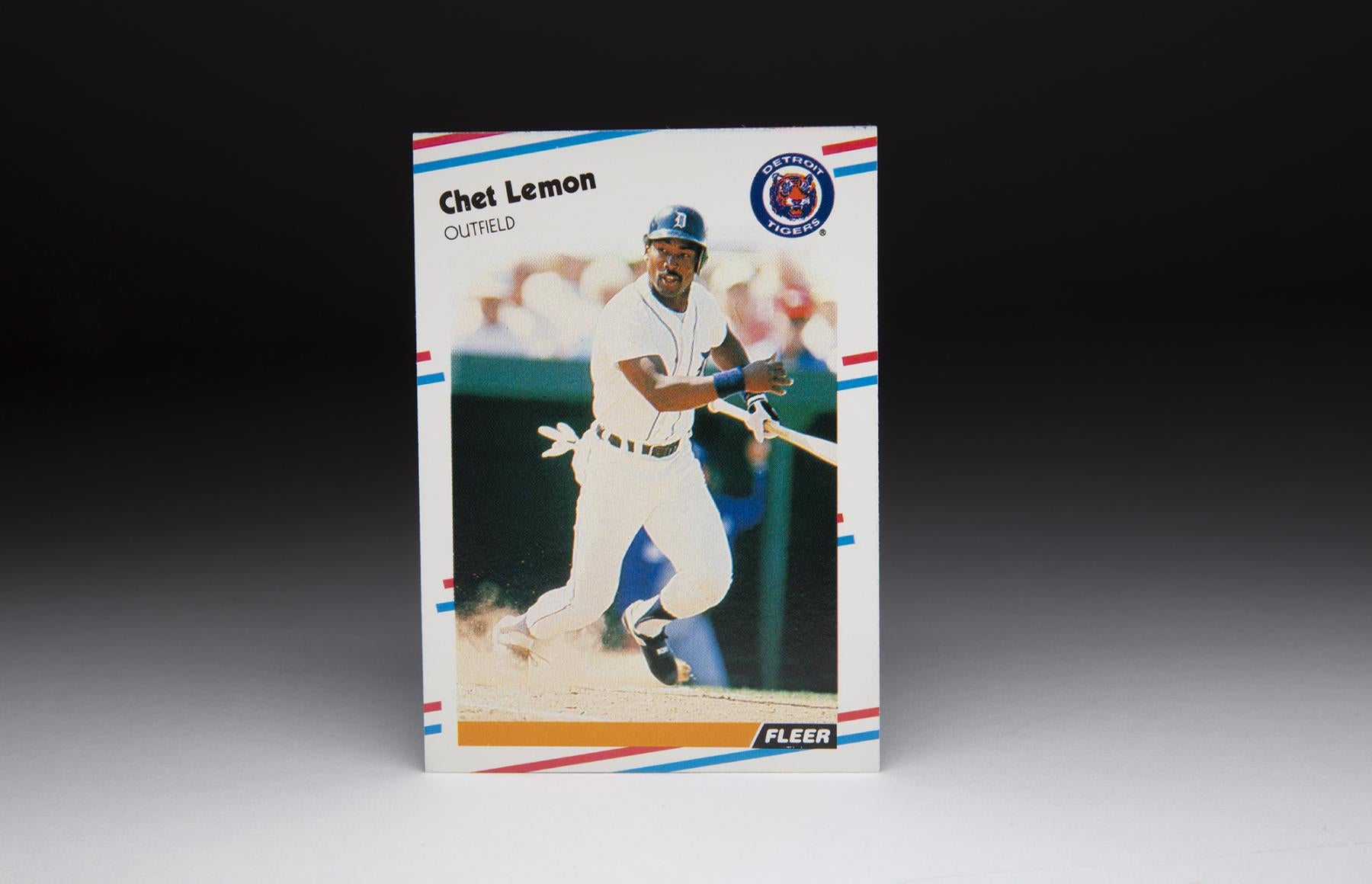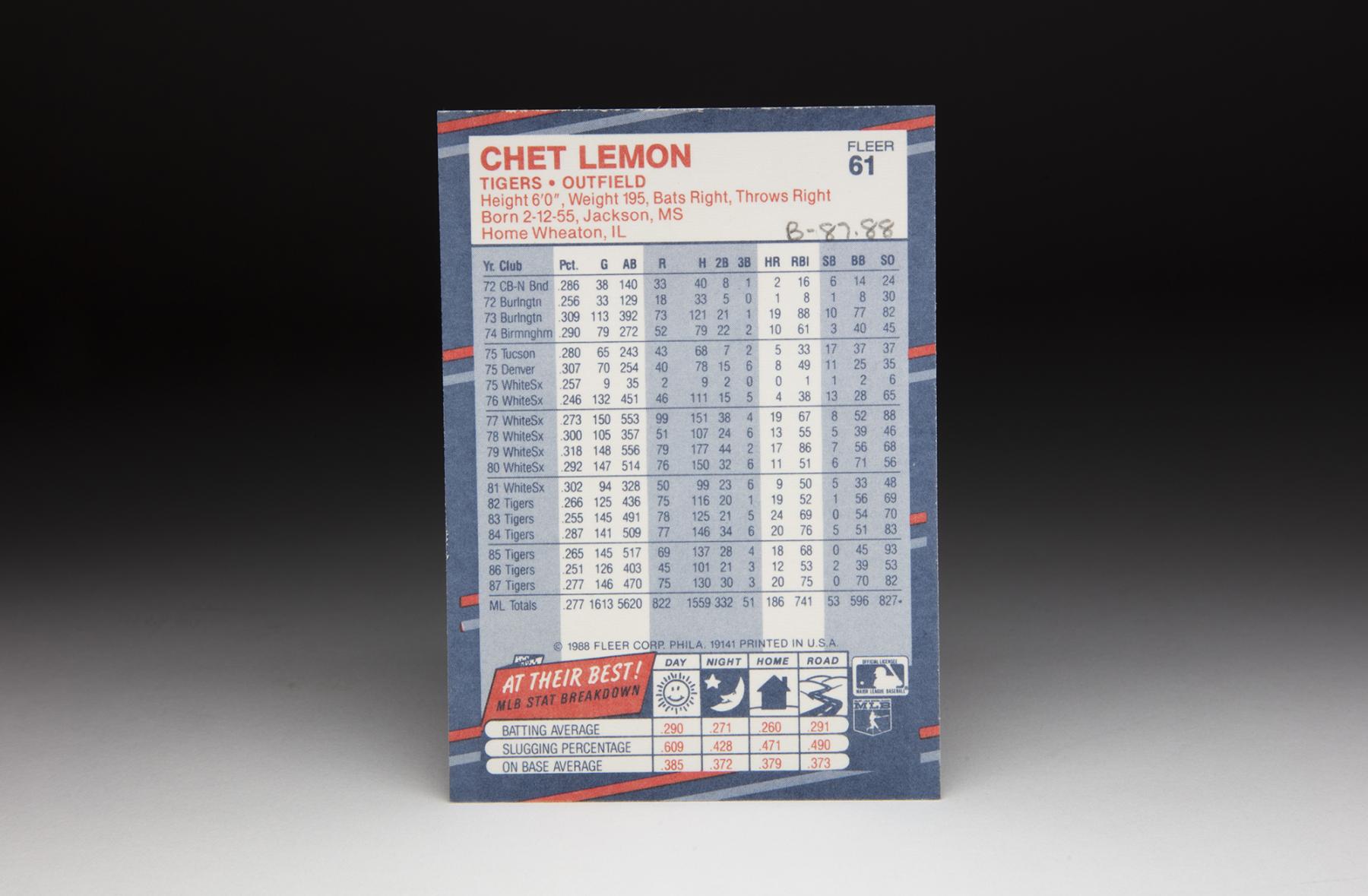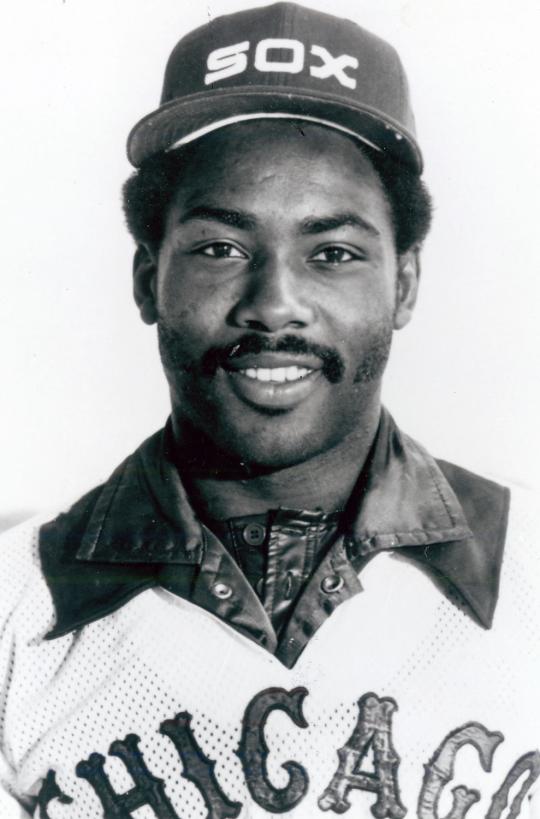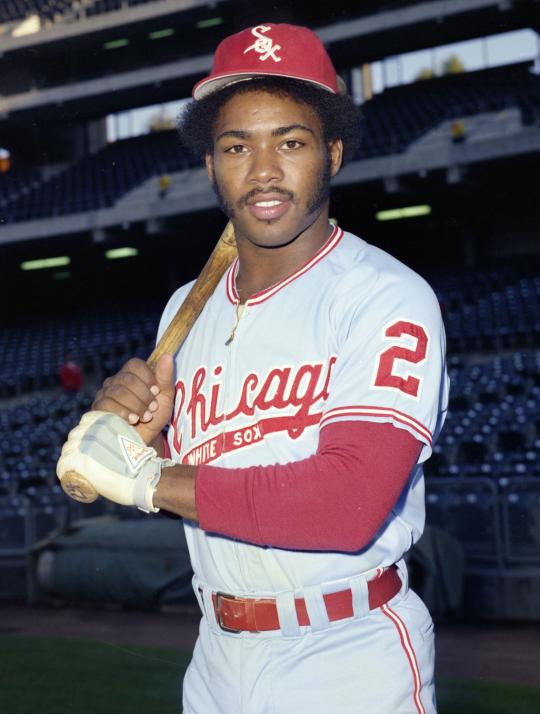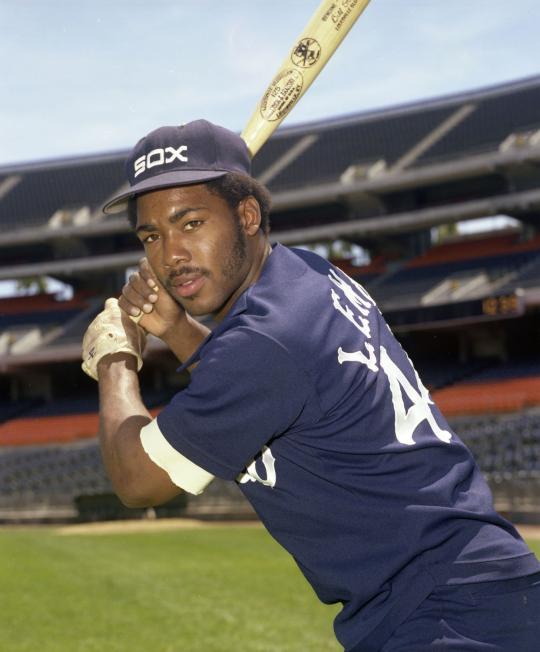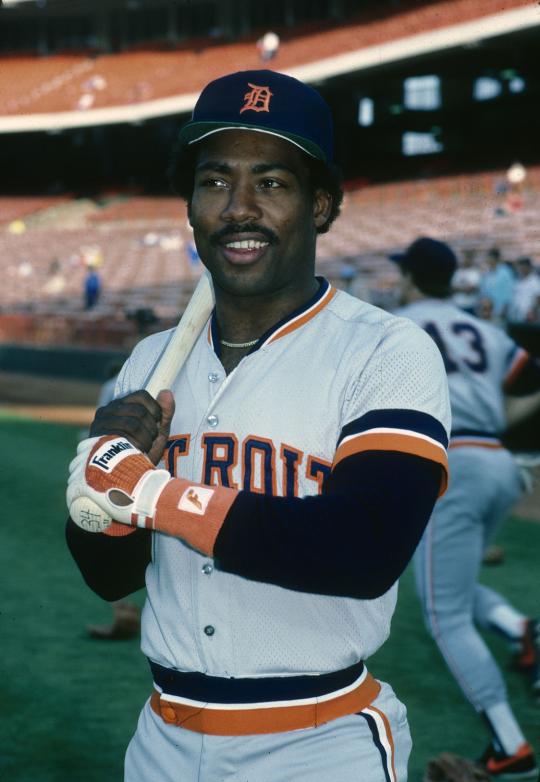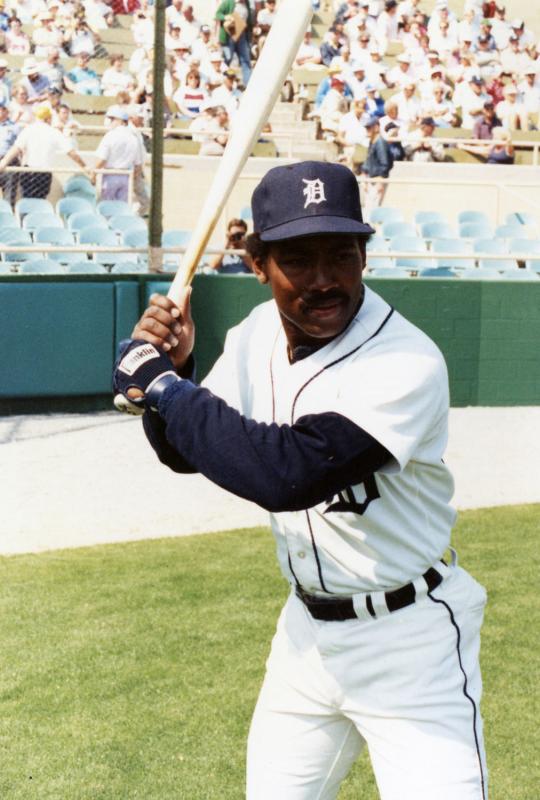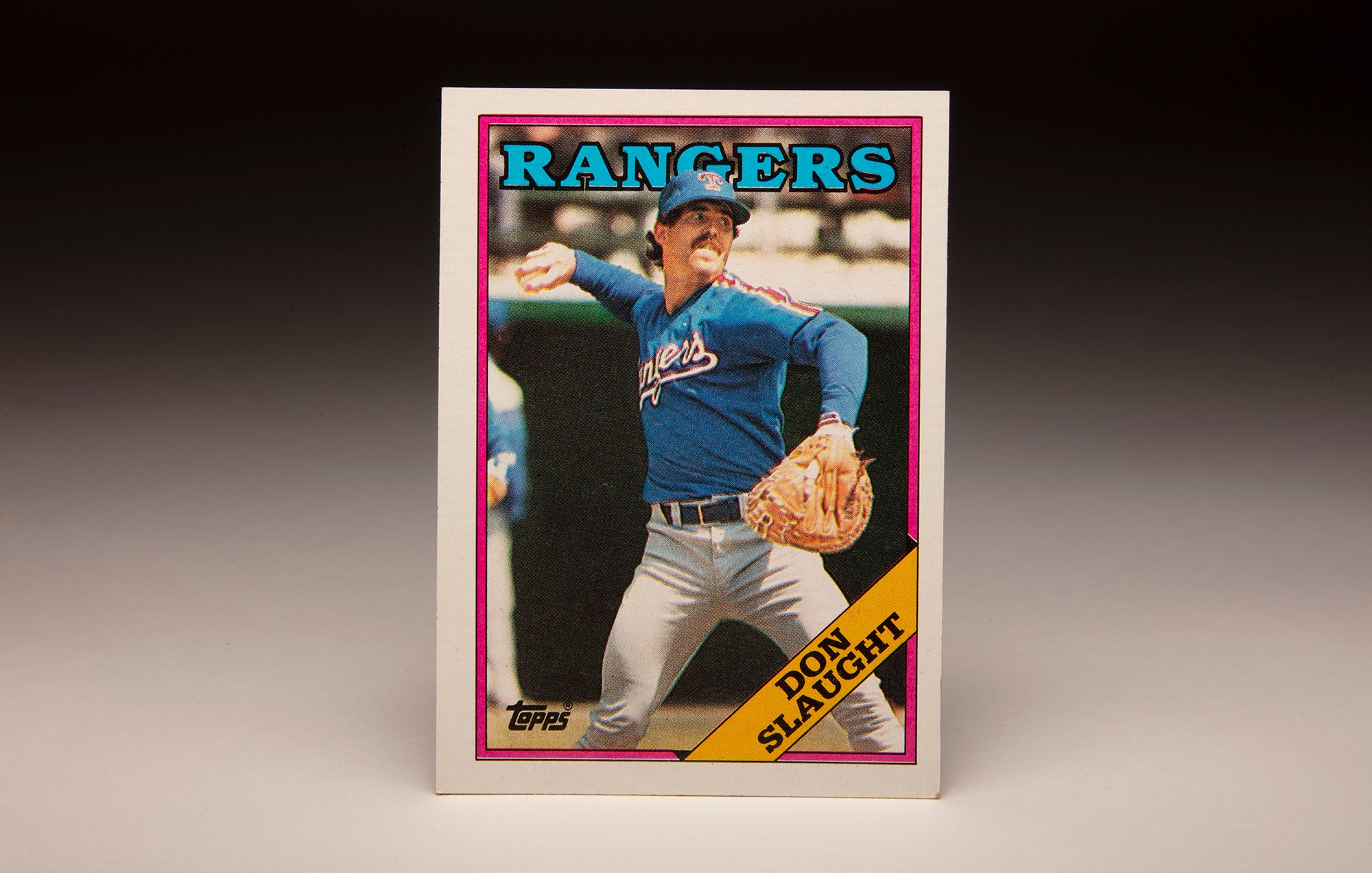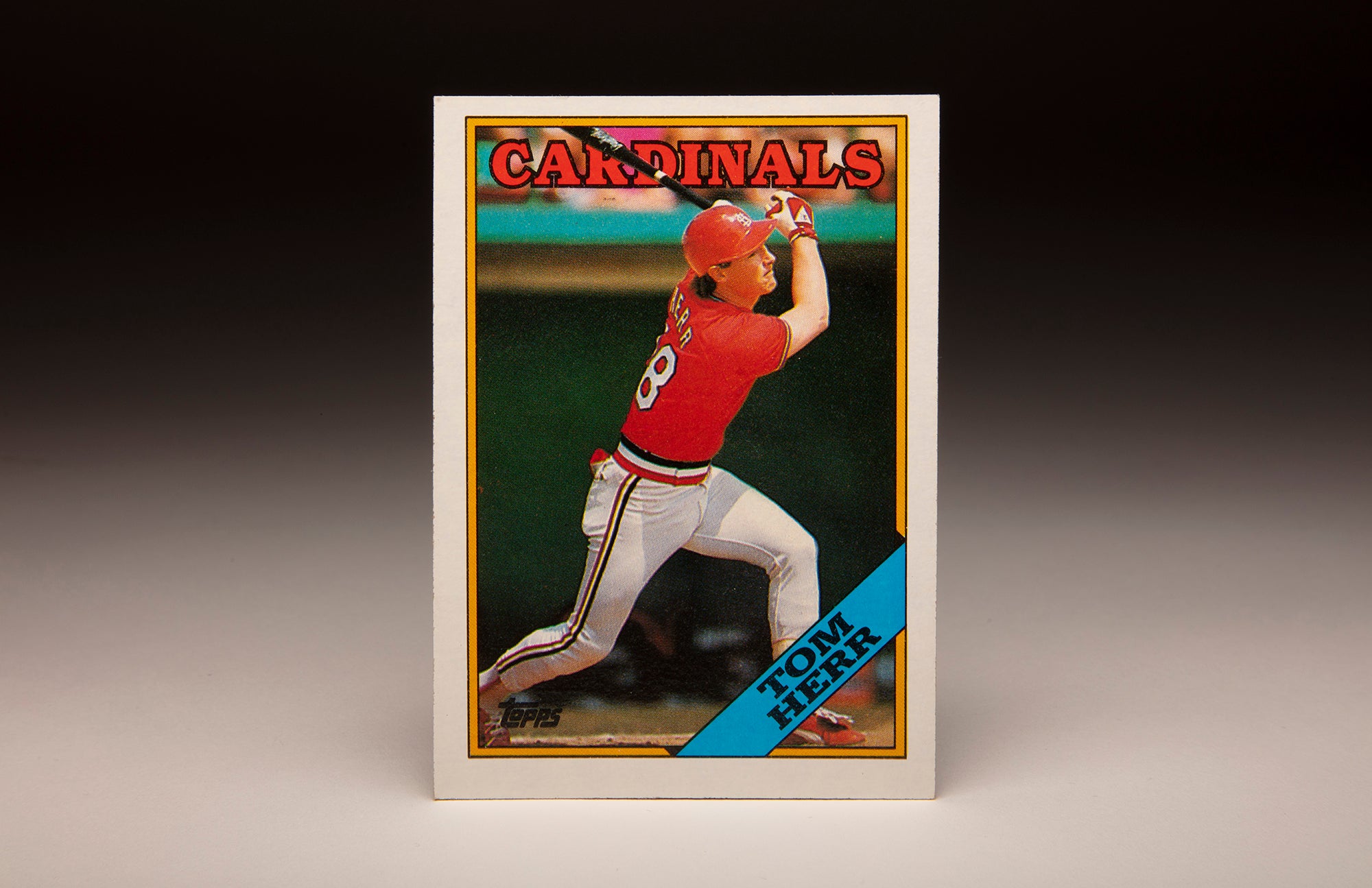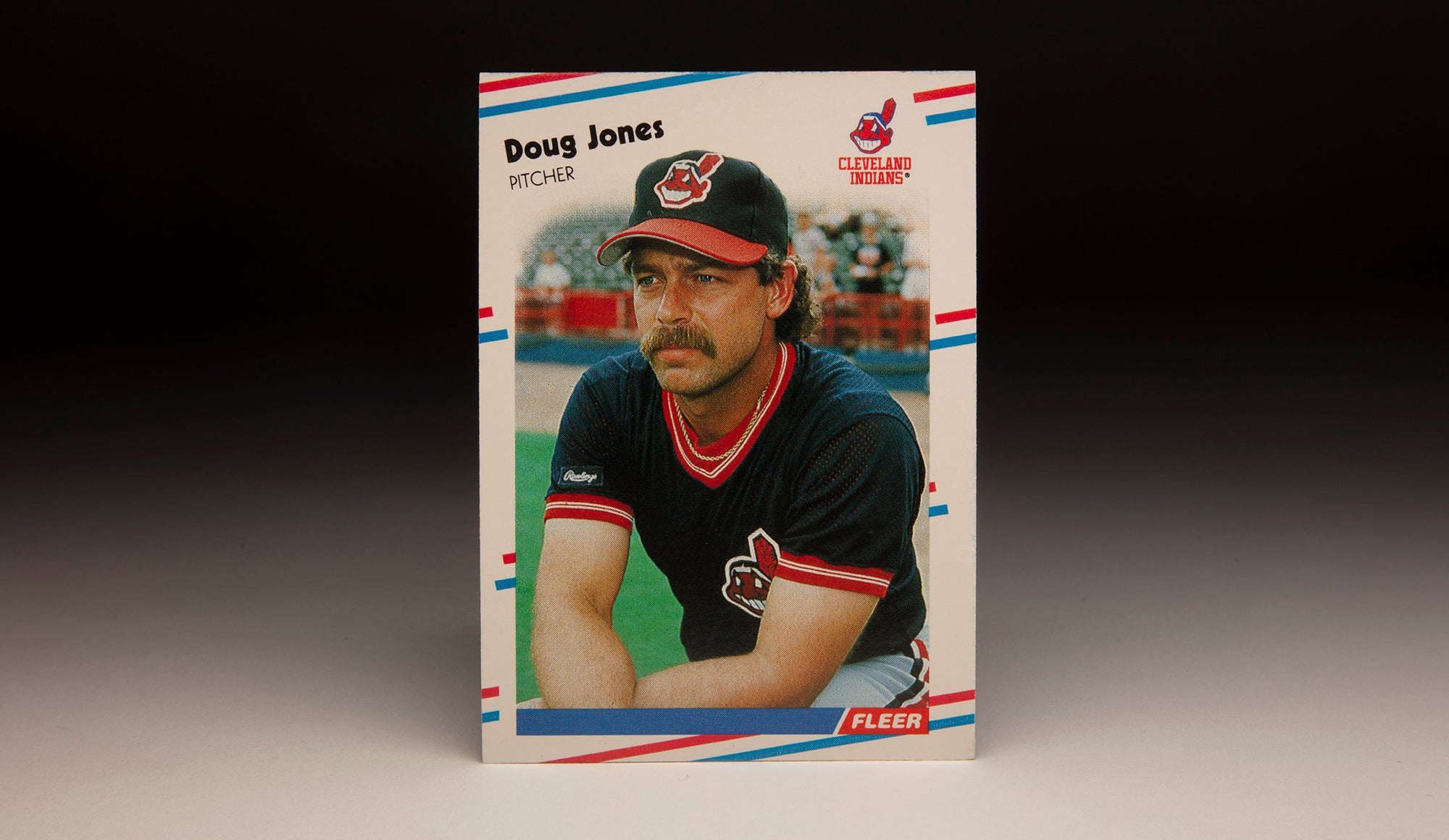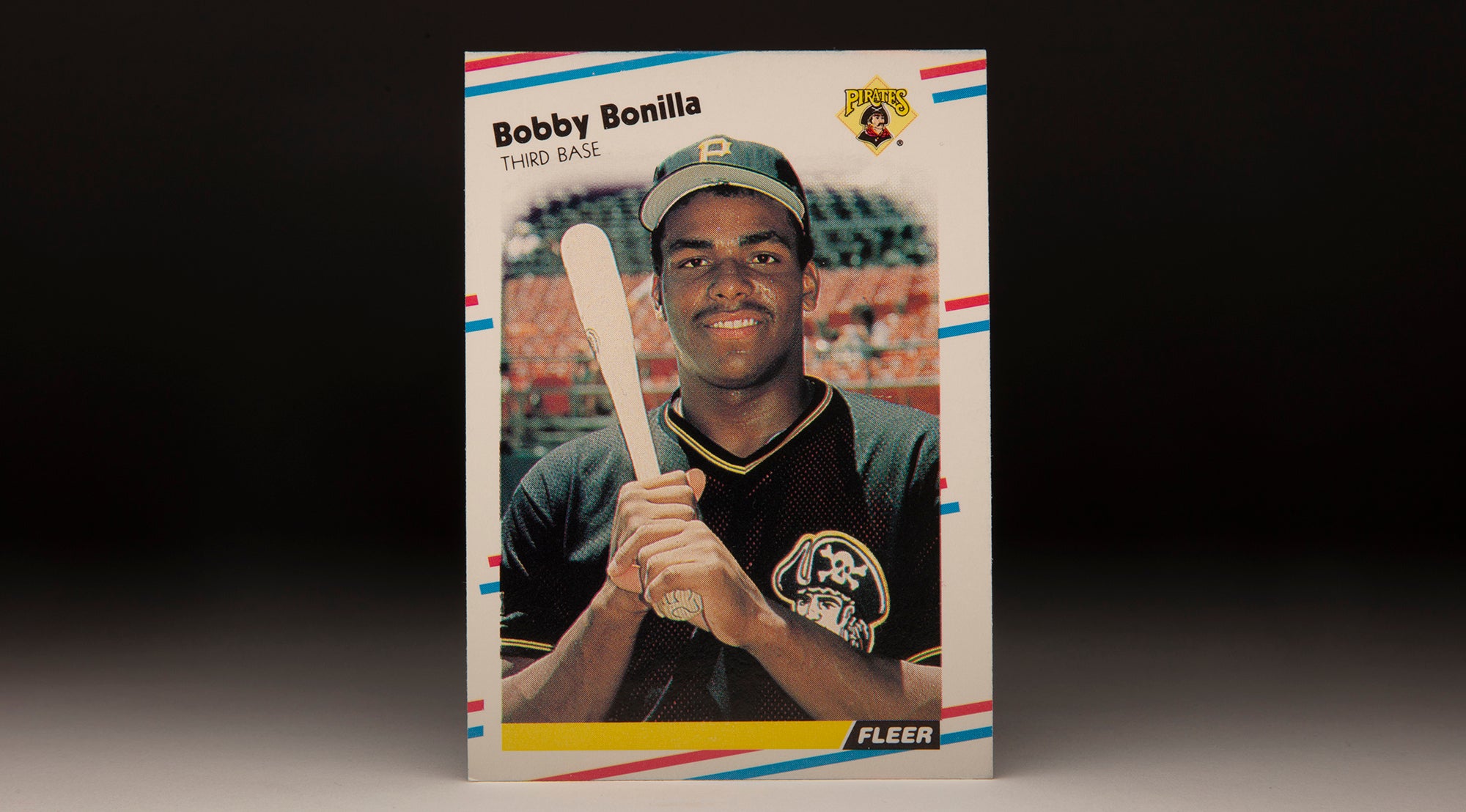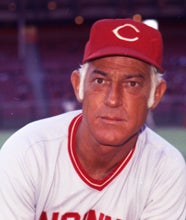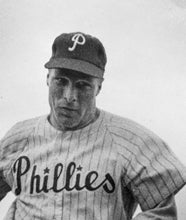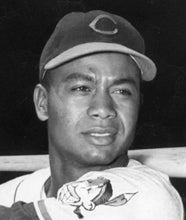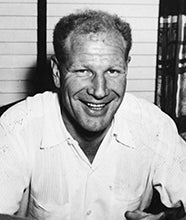- Home
- Our Stories
- #CardCorner: 1988 Fleer Chet Lemon
#CardCorner: 1988 Fleer Chet Lemon
In more than 140 years of big league baseball, there have been just eight seasons where an outfielder has recorded at least 500 putouts.
Four of those seasons belong to Hall of Famer Richie Ashburn, and Taylor Douthit of the Cardinals set the all-time record of 547 in 1928.
The American League mark of 512 was set in 1977 by Chet Lemon, possibly one of the most underrated players of his time.
Born Feb. 12, 1955, in Jackson, Miss., Chester Earl Lemon moved with his family to Southern California, where he attended Fremont High School in South Central Los Angeles with other future pro athletes like Ricky Bell and George Hendrick. Lemon excelled on the football field as a halfback and rover back, with Bell providing much of the blocking while Lemon carried the ball for more than 1,200 yards his senior year. On the baseball squad, Lemon teamed with future big leaguer Dan Ford.
The Oakland Athletics took Lemon with the 22nd overall pick in the 1972 MLB Draft, and Lemon spurned several football scholarship offers to sign with the A’s.
Lemon’s career WAR of 55.6 is more than double of any of the other 23 players taken in the first round.
The A’s sent Lemon to Coos Bay-North Bend of the Northwest League, where he batted .286 in 38 games before earning a promotion to Class A Burlington.
An infielder in high school, Lemon returned to Burlington and played third base in 1973, hitting .309 with 19 homers and 88 RBI in 113 games. But he also committed 33 errors at third base and another three in a handful of games at shortstop.
In 1974, Lemon was promoted to Double-A Birmingham, where he hit .290 with 10 homers and 61 RBI in 79 games. Then in 1975, Lemon began the season at Triple-A Tucson, where he hit .280 with 17 steals in 65 games – while also committing 19 errors at third base.
On June 15 – just moments before the trade deadline – the Athletics traded Lemon and pitcher Dave Hamilton to the White Sox in a deal that brought pitchers Stan Bahnsen and Skip Pitlock to Oakland. Lemon had been red hot during the previous week, going 17-for-34 in his last eight games for Tucson.
Chicago media outlets reported that Lemon was the key to the deal for the White Sox.
“We force-fed him a little,” Athletics owner Charlie Finley told the Chicago Tribune regarding Lemon, who at 20 years old was one of the youngest players in Triple-A. “He needs a little time.”
It would be a trade Finley would long regret as his Athletics’ dynasty crumbled.
Lemon remained an infielder for the rest of the 1975 season with Triple-A Denver, hitting .307 with the Bears to finish the minor league season with a .294 batting average, 13 home runs, 82 RBI and 28 stolen bases in 135 games. The White Sox brought him to the big leagues in September, where he hit .257 in nine games – including six at third base.
“I still have a little trouble throwing,” Lemon told the Chicago Tribune. “I’ve got a strong arm – Alvin Dark (manager of the Athletics) told me it was as strong an arm as he’s ever seen.
“I feel like I’m ready. I can play the outfield, too, and more of what I do out there is natural.”
The White Sox began preparing Lemon for a move to the outfield late in the 1975 season, and by Opening Day of 1976 Lemon was Chicago’s center fielder.
He hit .246 over 132 games, stealing 13 bases and acclimating himself to the big leagues at the age of 21.
“Life’s been no picnic for me,” Lemon told the Chicago Tribune. “I learned early that I was going to have to work for things, to hustle, and that whatever I got wasn’t going to come easy. I wanted to know that whatever I got, I earned it because I worked as hard as I did.”
The next season, Lemon was a part of the “South Side Hitmen” that won 90 games – after collecting just 64 wins in 1976 – and electrified crowds at Comiskey Park under owner Bill Veeck. Lemon hit .273 with 19 homers, 67 RBI, 99 runs scored to go with his 512 putouts, which broke the previous AL record of 503 set by Dom DiMaggio in 1948. Lemon also committed an AL-high 12 errors in center field as he roamed the vast expanse of the historic Chicago ballpark’s outfield.
“I’ve got to learn to pace myself,” Lemon told the Chicago Tribune prior to Spring Training of 1978 after he had signed a four-year contract worth a reported $750,000. “I was hitting about .288 three weeks before the season ended, but I was dragging when it was over.”
Lemon earned his first All-Star Game berth in 1978 but missed much of July and August with groin and hamstring injuries. He ended the season on a hot streak, however, pushing his average to .300 by hitting .345 with 14 RBI and 14 runs scored in September.
“He’s young, he’s aggressive and he wants to play,” White Sox manager and former AL All-Star Larry Doby told the Chicago Tribune in 1978. “With exposure, maturity and learning to control himself, to play with less anxiety, he can be real good. He has the aggressiveness of (Willie) Mays. He doesn’t have Mays’ power, but he reminds me of him. He’s better than I was.”
In 1979, Lemon put together his best all-around season, hitting .318 with an AL-best 44 doubles, 17 homers and 86 RBI while earning his second All-Star Game selection. Then in 1980, Lemon hit .292 with 11 homers and 51 RBI and followed that with a .302 average and 50 RBI in the strike-shortened season of 1981.
But Lemon was unable to come to terms with the White Sox on a new deal despite promising negotiations in the spring of 1981. So on Nov. 27, Chicago sent Lemon to the Tigers in a one-for-one deal for Steve Kemp, another outfielder who was negotiating a new contract.
“I only have one year left on my contract,” Lemon told the Chicago Sun-Times following the trade, “and anything can happen when you’re about to become a free agent.”
Kemp played only one season with the White Sox before signing with the Yankees as a free agent. Lemon became a hero in Detroit.
At first, Lemon’s transition was difficult. Tigers manager Sparky Anderson moved Lemon to right field and put Kirk Gibson in center, and Lemon struggled with the change – batting just .228 through July 2. But Anderson returned Lemon to center for the last three months of the season. And in his final 45 games, Lemon hit .321 with 13 homers to finish the season with a .266 average, 19 homers and 75 runs scored.
“A lot of times a trade affects players in different ways,” Tigers general manager Jim Campbell, who signed Lemon to a five-year contract extension after the season, told the Associated Press. “New surroundings, things like that. But he had turned down that contract in Chicago and I think maybe he came here and pressed and things got worse.”
Back in center to start the 1983 season, Lemon hit .255 but with a career-best 24 homers and 69 RBI for a Tigers team that topped the 90-win mark (at 92-70) for the first time since 1971. Then in 1984, the Tigers bolted to a 35-5 start as Lemon meshed with a team firing on all cylinders. He finished the year with a .287 batting average, 20 homers and 76 RBI – and led all AL center fielders with a .995 fielding percentage – as Detroit coasted to the AL East title in 104 wins.
Lemon was hitless in 13 at-bats in the ALCS, but it hardly mattered as the Tigers swept the Royals.
Then in the World Series, Lemon hit .294 with two stolen bases as Detroit beat San Diego in five games to capture the franchise’s first title since 1968.
In Game 3, Lemon made one of the signature plays of the series – robbing San Diego’s Terry Kennedy of extra bases with one on and two outs in the seventh inning and Detroit leading 5-2. Lemon sprinted toward the Tiger Stadium wall with the crack of the bat and turned several times before tracking down the ball and ending the threat.
Detroit would go on to win the game 5-2, taking a 2-games-to-1 lead in the series and never looking back.
“He’s been doing those catches all year,” Tigers teammate Milt Wilcox told the New York Daily News. “I saw pictures of the Willie Mays catch of Vic Wertz (in the 1954 World Series) and Chet made two of them last year that were better than that.
“We expect Chet to make those catches, and he’s turned into one of the best center fielders I’ve ever seen.”
Lemon and the Tigers were unable to repeat their success in 1985 as Lemon hit .265 with 18 homers and 68 RBI. He battled hamstring injuries in both legs in 1986, playing in just 126 games while hitting .251 with 12 homers and 53 RBI.
But in 1987, the Tigers recaptured the AL East title in a thrilling race with the Blue Jays. The 32-year-old Lemon hit .277 with 20 homers and 75 RBI – and hit .278 with two home runs and four RBI in the ALCS vs. the Twins. But Minnesota upset Detroit in five games.
Following the 1987 season, Lemon signed a four-year, $3.7 million deal to remain in Detroit. The Tigers moved Lemon to right field in 1988 to make room for Gary Pettis, and Lemon hit .264 with 17 homers and 64 RBI in what turned out to be his final season as regular.
In 1989, Lemon hit .237 with seven homers and 47 RBI in 127 games – and noticed he was having trouble recovering from minor injuries. Then in 1990, Lemon was diagnosed with polycythemia vera, a blood disorder which results in an overabundance of red blood cells. In 104 games that season, he hit .258 but totaled just five home runs and 32 RBI.
Riddled with abdominal pain in the spring of 1991 due to the disease, Lemon was released by the Tigers on the eve of the regular season, ending his career.
“I think Chet felt like it was coming,” Tigers teammate Lloyd Moseby told the Associated Press. “He acted like he knew it.”
Lemon was soon admitted to a hospital where he was put on blood thinners to try to prevent internal clotting – and he remained bed-ridden for weeks. Eventually, Lemon was able to return to normal activity and started Chet Lemon’s School of Baseball in Lake Mary, Fla., coaching youth teams in the area.
But in 1999, Lemon learned his illness – which at the time carried a life expectancy of about 15 years after diagnosis – had caused an enlarged spleen, which had to be removed. This caused a conflict with his Jehovah’s Witness beliefs, which do not permit blood transfusions.
“People don’t understand why you’d take a chance,” Lemon, who embraced his Jehovah’s Witness faith when he was 19 years old, told the Tampa Bay Times in 2003. “If you don’t understand what I feel and believe, of course you are going to question that.
“I was very afraid, but if I was going to survive I had to put my trust in my faith.”
In November of 2001, Lemon had the surgery at the Mayo Clinic – instructing the doctors not to do any transfusions. His spleen weighed almost 15 times the amount of a normal spleen. But the surgeons were able to successfully remove it.
Lemon had been hired to coach at Eustis High School – located northwest of Orlando – in 2001, and returned after the surgery to coach his son, Marcus, at the school. Lemon helped the team win a state title in 2003, and Marcus was later selected in the fourth round of the 2006 MLB Draft by the Texas Rangers. In 11 seasons in the minor leagues, Marcus – an infielder – made it as high as Triple-A.
Lemon passed away on May 8, 2025, at his home in Apopka, Fla.
In 16 big league seasons, Chet Lemon hit .273, totaling 1,875 hits, 396 doubles, 215 home runs, 884 RBI and 973 runs scored. His career total of 4,993 putouts ranks 22nd all-time among outfielders – and Lemon’s 16 seasons are the fewest of anyone in the Top 35 all-time.
“God blessed me with a lot of things,” Lemon told the Wisconsin State Journal, “and baseball was one of them.”
Craig Muder is the director of communications for the National Baseball Hall of Fame and Museum

